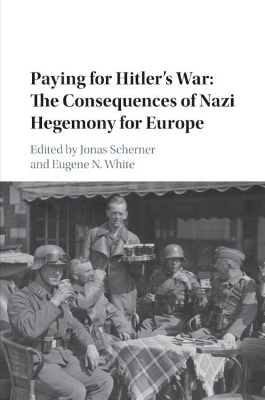
Paying for Hitler's War
Cambridge University Press (Verlag)
978-1-107-62801-4 (ISBN)
During World War II, Germany occupied much of continental Europe. Although the social and political history of this occupation has been studied extensively, the economics of the unprecedented transfer of resources has received surprisingly little attention. Allies, neutrals, and conquered nations under German hegemony were a vital source of supplies for Hitler's war machine. Without the war material, consumer goods and labor they provided, Germany would not have been able to wage a prolonged multi-front war. All of these countries suffered enormous losses, but each had a distinct experience that depended on Germany's wartime needs, whether they were allied, occupied or neutral, and their place in Nazi racial ideology. Paying for Hitler's War is a comparative economic study which explores these different experiences through case studies of twelve nations spanning the European continent.
Jonas Scherner is Professor of Modern European Economic History at the Norwegian University of Science and Technology, Trondheim. Eugene N. White is Distinguished Professor of Economics at Rutgers University, New Jersey and a Research Associate at the National Bureau of Economic Research, Massachusetts.
Introduction Jonas Scherne and Eugene N. White; Part I. Germany's Wartime Dilemma: 1. Putting Versailles into perspective - Germany's economic aims for a victorious war in 1918 Carsten Burhop; 2. Germany's financial policies in Europe under Nazi hegemony - some fundamental principles, conflicts, and results Jonas Scherner; 3. Employing the enemy - the economic exploitation of POW and foreign labor from occupied territories by Nazi Germany Johann Custodis; Part II. The Occupied West: 4. The long shadow of Vichy - the long-term consequences of German occupation in France Eugene N. White; 5. Forced collaboration, entrepreneurial strategies, and their long-term effects in France Marcel Boldorf; 6. The Netherlands in ruins? Postwar economic problems in the Netherlands as a result of the German occupation Martijn Lak; 7. La politique du moindre mal - twice-occupied Belgium Kim Oosterlinck and Eugene N. White; 8. The economic and social impact of German construction programs in occupied France and Italy, 1940–5 Fabian Lemmes; Part III. Northern Europe: 9. Economic effects of the German occupation of Norway, 1940–5 Harald Espeli; 10. Sweden as an occupied country? Swedish-belligerent trade during World War II Eric Golson; 11. The impact of the German occupation in Denmark, 1940–5 Steen Andersen; 12. Master and slave? Equal partners? Economic interactions and exchange of strategic resources between Germany and Finland during the Second World War Jari Eloranta and Ilkka Nummela; Part IV. Eastern Europe: 13. System transformation as a consequence of war? Czechoslovakia's path from war to a planned economy Jaromir Balcar and Jaroslav Kucera; 14. German economic exploitation of Bulgaria, 1932–44 - short-term policies and long-term institutional effects Vera Asenova; 15. Soviet economic warfare, the German occupation of Ukraine, and the economics of the limiting factor Kim Christian Priemel; 16. The economic consequences of German occupation policy in Poland Romana Bräu.
| Erscheinungsdatum | 15.11.2018 |
|---|---|
| Reihe/Serie | Publications of the German Historical Institute |
| Zusatzinfo | 53 Tables, black and white; 11 Halftones, unspecified; 11 Halftones, black and white |
| Verlagsort | Cambridge |
| Sprache | englisch |
| Maße | 149 x 228 mm |
| Gewicht | 600 g |
| Themenwelt | Geschichte ► Allgemeine Geschichte ► 1918 bis 1945 |
| Geisteswissenschaften ► Geschichte ► Regional- / Ländergeschichte | |
| Geschichte ► Teilgebiete der Geschichte ► Militärgeschichte | |
| Geschichte ► Teilgebiete der Geschichte ► Wirtschaftsgeschichte | |
| Wirtschaft ► Allgemeines / Lexika | |
| ISBN-10 | 1-107-62801-6 / 1107628016 |
| ISBN-13 | 978-1-107-62801-4 / 9781107628014 |
| Zustand | Neuware |
| Informationen gemäß Produktsicherheitsverordnung (GPSR) | |
| Haben Sie eine Frage zum Produkt? |
aus dem Bereich


